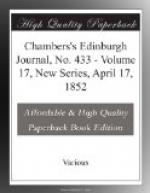Our author has some judicious remarks on ’Criticism, its Curiosities and Researches,’ and is himself a critic of refined and delicate appreciation. We certainly do not agree with him in thinking that the literature of the last century is superior to that of the present; but we can nevertheless admit that many of his favourite writers are deserving of a higher and more reverent regard than is now generally awarded them. We would quarrel with no man about his preferences; still, we cannot hold Mr Willmott justified in such sweeping condemnation of our current literature as he appears disposed to pass upon it. It would seem, indeed, that in his disgust at ’the corrupted streams of popular entertainment,’ he has not cared to make himself acquainted with the best of our modern writers. Of these he seems—if we may judge from his total oversight of them—to have hardly a knowledge of the names. ‘He lives,’ as he admits, ’among the society of an elder age.’ Here, however, he numbers ’tasteful learning with the chiefest blessings of his home.’ If he had lived in the last century, he would probably have gone back for his idols to an earlier one; and yet his remarks on taste and criticism are of a catholic nature, although his just application of their canons have this chronological boundary. We have no room, however, for his disquisition on these elegant subjects; neither can we follow our accomplished clergyman into his disquisitions on fiction, history, biography, philosophy, and its pleasures, nor the ‘domestic interiors’ of taste and learning. We had intended to quote some fine sentences on the consolations of poetry, but find we have not room for them. The reader will do well to get the book, and read them there. It is a work altogether well worth reading. Nay, it will bear reading many times, and even become pleasanter as one’s acquaintance with it increases. Indeed, it is not at all the kind of book to be run through rapidly, and so disposed of; the thought and observation in it are closely packed and methodised; and if you wish to derive any benefit, or even pleasure from the perusal, you will need to read deliberately. We should say the author thoroughly enjoyed his work while he was engaged in it; but the workmanship exhibits everywhere the greatest care and patience. The same habit of mind employed in writing it will be required in the reading. We may describe the book as being a graceful, suggestive review of literature, considered with regard to its enjoyments. Refined, scholarly, tolerant, and judicious in all his tastes and sympathies, the author’s influence upon other minds cannot be otherwise than wholesome, elevating, and benignant.
FOOTNOTES:
[4] Pleasures, Objects, and Advantages of Literature. A Discourse, by the Rev. Robert Aris Willmott, Incumbent of Bear Wood, Berks. Bosworth: London.




